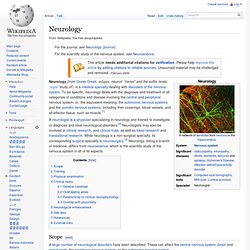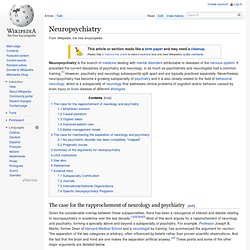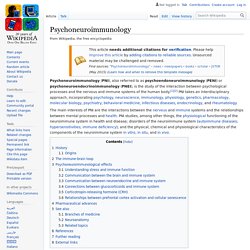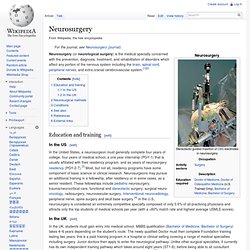

Neurology. Neurology (from Greek Greek: νεῦρον, neuron' "nerve" and the suffix -λογία -logia "study of") is a medical specialty dealing with disorders of the nervous system.

To be specific, neurology deals with the diagnosis and treatment of all categories of conditions and disease involving the central and peripheral nervous system; or, the equivalent meaning, the autonomic nervous systems and the somatic nervous systems, including their coverings, blood vessels, and all effector tissue, such as muscle.[1] A neurologist is a physician specializing in neurology and trained to investigate, or diagnose and treat neurological disorders.[2] Neurologists may also be involved in clinical research, and clinical trials, as well as basic research and translational research.
Scope[edit] A large number of neurological disorders have been described. These can affect the central nervous system (brain and spinal cord), the peripheral nervous system, or the autonomic nervous system. Neuropsychiatry. The case for the rapprochement of neurology and psychiatry[edit] Given the considerable overlap between these subspecialities, there has been a resurgence of interest and debate relating to neuropsychiatry in academia over the last decade.[1][2][3][4][5] Most of this work argues for a rapprochement of neurology and psychiatry, forming a specialty above and beyond a subspecialty of psychiatry.

For example, Professor Joseph B. Martin, former Dean of Harvard Medical School and a neurologist by training, has summarized the argument for reunion: "the separation of the two categories is arbitrary, often influenced by beliefs rather than proven scientific observations. And the fact that the brain and mind are one makes the separation artificial anyway. Mind/brain monism[edit] In sum, one reason for the division between psychiatry and neurology was the difference between mind or first-person experience and brain. Causal pluralism[edit] Organic basis[edit] Improved patient care[edit] See also[edit] Psychoneuroimmunology. Psychoneuroimmunology (PNI), also referred to as psychoendoneuroimmunology (PENI) or psychoneuroendocrinoimmunology (PNEI), is the study of the interaction between psychological processes and the nervous and immune systems of the human body.[1][2] PNI takes an interdisciplinary approach, incorporating psychology, neuroscience, immunology, physiology, genetics, pharmacology, molecular biology, psychiatry, behavioral medicine, infectious diseases, endocrinology, and rheumatology.

The main interests of PNI are the interactions between the nervous and immune systems and the relationships between mental processes and health. PNI studies, among other things, the physiological functioning of the neuroimmune system in health and disease; disorders of the neuroimmune system (autoimmune diseases; hypersensitivities; immune deficiency); and the physical, chemical and physiological characteristics of the components of the neuroimmune system in vitro, in situ, and in vivo.
History[edit] Origins[edit] Neurosurgery. Neurosurgery (or neurological surgery) is the medical specialty concerned with the prevention, diagnosis, treatment, and rehabilitation of disorders which affect any portion of the nervous system including the brain, spinal cord, peripheral nerves, and extra-cranial cerebrovascular system.[1][2] Education and training[edit] In the US[edit] In the UK[edit] In the UK, students must gain entry into medical school.

MBBS qualification (Bachelor of Medicine, Bachelor of Surgery) takes 4–6 years depending on the student's route. Neurosurgical methods[edit] Neuroradiology methods are used in modern neurosurgical diagnosis and treatment, including computer assisted imaging computed tomography (CT), magnetic resonance imaging (MRI), positron emission tomography (PET), magnetoencephalography (MEG), and the stereotactic surgery. Microsurgery is utilized in many aspects of neurological surgery. Minimally invasive endoscopic surgery is utilized by neurosurgeons. Conditions[edit] See also[edit]